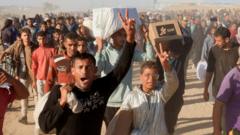Rear Admiral Ali Shamkhani, a prominent Iranian military figure previously thought to be dead after an Israeli strike, appeared publicly for the first time since the attack, visibly weakened but alive, amidst significant geopolitical tensions following military actions targeting Iran's infrastructure.
Iranian Official Survives Israeli Missile Strike, Apparent Health Deterioration Revealed

Iranian Official Survives Israeli Missile Strike, Apparent Health Deterioration Revealed
Rear Adm. Ali Shamkhani makes a public appearance following a presumed lethal Israeli attack, showcasing resilience despite visible health issues.
In a striking turn of events, Rear Adm. Ali Shamkhani, a senior adviser to Iran’s supreme leader, was spotted attending a funeral in Tehran, despite initial reports suggesting he had been killed in an Israeli missile strike last month. The airstrike, which took place on June 13, marked the beginning of a 12-day conflict, later involving U.S. forces.
Images released by Iranian state media revealed the extent of the damage from the missile attack that hit Shamkhani's upscale penthouse in northern Tehran — the destruction was extensive, leading to speculation about his status as he had not been seen publicly since the incident. Initial allegations claimed the admiral had been fatally wounded; however, his recent appearance at a military funeral has cast doubt on those reports.
Attending the service in a black suit, the 69-year-old looked frail, relying on a cane for support while displaying visible signs of weakness. His appearance sparked renewed discussions regarding the impact of the airstrikes; Iranian authorities claim that these operations resulted in at least 935 casualties, including numerous military personnel and civilians.
Shamkhani is a figure of considerable influence in Iran, playing a pivotal role in negotiations concerning the nation's nuclear capabilities. His dismissal would have represented a significant blow to Iranian defense strategies. Having previously served as the secretary of the Supreme National Security Council, his survival signals notable resilience amidst ongoing conflict, raising questions about the future dynamics of Iran's military and geopolitical strategies.






















